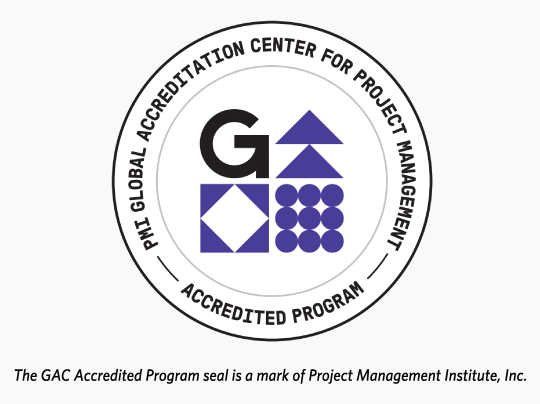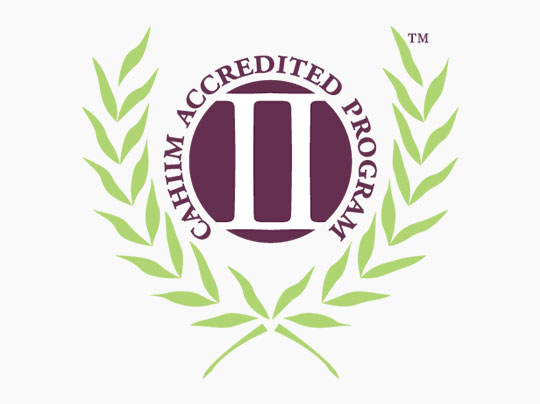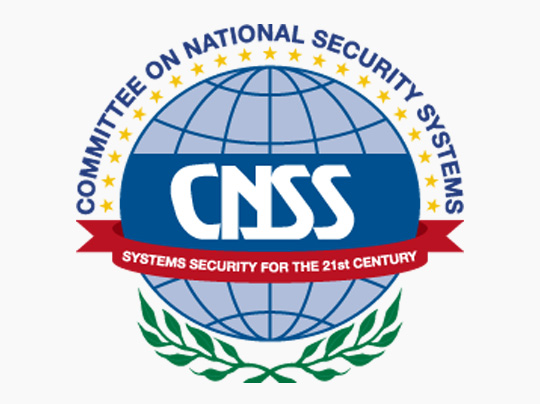Immerse Yourself in the Business Side of Technology
Available on campus, online, and in a blended format, the Master of Science in Computer Information Systems (MSCIS) at Boston University’s Metropolitan College (MET) is designed to immerse you in the fast-paced world of technological innovation—preparing you for IT leadership positions in sectors of high demand, such as the professional and financial services, manufacturing, healthcare, and education.
The MSCIS degree program offers optional concentrations in:
Program at a Glance
- Top 10 Online Program since 2014
- Online, On Campus, and Blended
- Part-Time or Full-Time Study
- STEM Designated
- 40 Credits
- 12–20 Months to Completion
- 17 Core Faculty
- No GRE/GMAT
- Tuition & Fees Range—Part-Time Study*: $34,200–$35,900
*Based on 2024–2025 Boston University tuition and fees. Merit scholarship may reduce cost.
Advance Your Career with a Master’s in Computer Information Systems
Closely aligned with, but distinct from, computer science and management information systems, BU MET’s MS in Computer Information Systems program is ideal for those interested in leadership roles in the realm of information systems. Students in the MSCIS program typically have several years of experience in software development or software engineering and are now seeking to advance in their organizations by building-up key skills in areas such as problem-solving, project and change management, planning and organization, negotiation and influencing, commercial awareness and business acumen, the understanding of user and customer requirements, and the ability to contribute to a team objective.
The BU MET master’s degree program in Computer Information Systems develops technical competence in information systems and increases knowledge of managerial and organizational issues, preparing you to integrate information technology with the business needs of an organization. That means honing strong leadership and communication abilities and providing hands-on expertise in areas such as systems analysis and design, computer networks, cybersecurity, data analytics, database management, health IT, IT project management, web application development, and more.

#8, Best Online Master's in Computer Information Technology Programs
MET’s online master’s degrees in computer information technology are ranked #8 in the nation by U.S. News & World Report for 2024.
Learn More
Request Information
Receive more details about your program of interest.
Learn More
Computer Science Career Outlook
Top computer science careers in data science, software development, and other popular areas of IT.
Learn more

PMI Global Accreditation Center for Project Management
BU MET’s MS in Project Management and MS in Computer Information Systems concentration in IT Project Management are accredited by the Project Management Institute Global Accreditation Center for Project Management Education Programs (GAC).
Learn More
CAHIIM Accredited
MET's master's degree program in Computer Information Systems (Health Informatics concentration) is accredited by the Commission on Accreditation for Health Informatics and Information Management Education (CAHIIM).
Learn More
A National Center of Academic Excellence
Boston University has been designated a Center of Academic Excellence (CAE) in Cyber Defense and Research by the National Security Agency and Department of Homeland Security. Our information security programs are certified by the Committee on National Security Systems (CNSS).
Learn More
“Mobile Forensics and Security [courses] gave me insights about what is happening in a mobile device at very profound level. By talking to an Amazon developer, I noticed that this kind of knowledge is both rare and valuable.”—Alexis Yang (MET’18), Software Developer Engineer at Amazon for the project Amazon GO
Why BU’s Computer Information Systems Degree Has Been Top 10 since 2014
- Accreditation: The master’s degree concentration in Health Informatics is accredited by the Commission on Accreditation for Health Informatics and Information Management Education (CAHIIM). The master’s degree concentration in IT Project Management is accredited by the Project Management Institute Global Accreditation Center for Project Management Education Programs (GAC).
- Recognized & Certified: Boston University is recognized by the National Security Agency and the Department of Homeland Security as a Center of Academic Excellence (CAE) in Cyber Defense and Research. BU MET’s information security programs are certified by the Committee on National Security Systems (CNSS).
- Active Learning Environment: BU MET’s Computer Information Systems courses ensure you get the attention you need, while introducing case studies and real-world projects that ensure you gain in-depth, practical experience with the latest technologies. In addition, BU’s Center for Reliable Information Systems and Cyber Security (RISCS) offers opportunities to collaborate and participate in research on system reliability and information security.
- Career Counseling: MET’s Career Development office and BU’s Center for Career Development offer a variety of job-hunting resources, including one-on-one career counseling by appointment for both online and on-campus students.
- Engaged Faculty: In BU MET’s Computer Information Systems master’s program, you benefit from working closely with highly qualified faculty and industry leaders who have hands-on involvement in building networks, developing applications, and fighting cybercrime for the world’s top companies.
- Extensive Network: Study information systems alongside peers with solid business experience, learn from faculty who have valuable IT contacts across several sectors, and benefit from an alumni community with strong professional connections.
- STEM Designated: Eligible graduates on student visas have access to an Optional Practical Training (OPT) of 12 months and an extension for up to 24 additional months.
- 15:1 Class Ratio: Enjoy an exceptional student-to-instructor ratio, ensuring close interaction with faculty and access to support.
- Valuable Resources: Make use of Boston University’s extensive resources, including the Center for Career Development, Educational Resource Center, Fitness & Recreation Center, IT Help Centers, Mugar Memorial Library, Center for Antiracist Research, Howard Thurman Center for Common Ground, George Sherman Union, Rafik B. Hariri Institute for Computing and Computational Science & Engineering, and many others.
- Flexible Options: Study at the pace that works for you, evenings on campus, fully online, or in the blended format that combines on-campus and online learning. Courses begin fall, spring, and summer; online courses have two starts per term.
- Track Record: Learn from the best—BU MET’s Department of Computer Science was established in 1979 and is the longest-running computer science department at BU. Over its four decades, the department has played an important role in the emergence of IT at the University and throughout the region.
- Merit Scholarships: US citizens and permanent residents are automatically considered during the application process and nominated based on eligibility. Learn more.
Master the Tools to Excel in Computer Information Systems
Offered through BU MET’s Department of Computer Science, the Master of Science in Computer Information Systems (MSCIS) is designed for those who are seeking entry to an information technology career, as well as those seeking to advance in one. Our faculty consists of academic leaders who are engaged in innovative research and skilled industry experts with experience building networks, ensuring information security for top global companies, and developing applications.
Upon graduation, students in the MSCIS program are able to demonstrate in-depth knowledge of vital importance to organizations, such as business requirements, systems analysis and design, database technology, information systems development, web and mobile application systems, cybersecurity, data analytics, project management practice, and leadership.
BU MET’s Computer Information Systems master’s degree prepares you for jobs that are seeing faster-than-average growth and excellent salaries. According to the U.S. Bureau of Labor Statistics, the median annual wage for computer and information systems managers (for instance) is more than $146,000. And with seven concentrations, the Computer Information Systems master’s encompasses several other fast-growing and well-paid segments of the IT job market, providing the foundation for work as an application analyst, data analyst, data scientist, cybersecurity analyst, IT consultant, network and computer systems administrator, computer systems analyst, database administrator, and many other integral positions in an organization.
Graduate with Expertise
Metropolitan College’s Computer Information Systems master’s degree will equip you with:
- Advanced knowledge in the analysis and documentation of requirements for architecture, design, and implementation of computer applications systems.
- Proficiency in software and computing skills as they pertain to the design and implementation of database systems, data communications, systems analysis, and design.
- Competence sufficient to identify current and emerging information technologies that may have strategic value for enterprise; assess where those technologies have value; and manage the implementation of those technologies in the enterprise.
- Moderate skill in programming for application systems in an application programming language such as Java or Python.
Certificate-to-Degree Pathway
BU MET graduate certificate programs can serve as building blocks to a master’s degree. Each certificate shares specific courses with the master’s in Computer Information Systems program, giving you the option to take one, two, or three certificates on your path to a master’s degree. Students currently enrolled in a graduate certificate who are interested in transitioning into a master’s degree should contact their academic advisor to declare their interest in this pathway. A new master’s degree application is not required. Connect with a graduate admissions advisor at csadmissions@bu.edu to learn more about this option.
The following graduate certificate programs can be applied to the master’s degree:
Master’s in Computer Information Systems Curriculum
A total of 40 credits is required.
Students who are not declaring an MSCIS concentration must complete the core and required courses and choose four electives:
Core Courses
(Five courses/20 credits)
MET CS 625 Business Data Communication and Networks
Summer ‘24
This course presents the foundations of data communications and takes a bottom-up approach to computer networks. The course concludes with an overview of basic network security and management concepts. Prereq: MET CS 200, or instructor's consent. This course may not be taken in conjunction with MET CS 425 (undergraduate) or MET CS 535. Only one of these courses can be counted towards degree requirements. [ 4 cr. ]
MET CS 669 Database Design and Implementation for Business
Summer ‘24
Students learn the latest relational and object-relational tools and techniques for persistent data and object modeling and management. Students gain extensive hands- on experience using Oracle or Microsoft SQL Server as they learn the Structured Query Language (SQL) and design and implement databases. Students design and implement a database system as a term project. Restrictions: This course may not be taken in conjunction with MET CS 469 (undergraduate) or MET CS 579. Only one of these courses can be counted towards degree requirements. [ 4 cr. ]
MET CS 682 Information Systems Analysis and Design
Summer ‘24
Object-oriented methods of information systems analysis and design for organizations with data- processing needs. System feasibility; requirements analysis; database utilization; Unified Modeling Language; software system architecture, design, and implementation, management; project control; and systems-level testing. Prerequisite: Basic programming knowledge or instructor's consent. [ 4 cr. ]
MET CS 782 IT Strategy and Management
Summer ‘24
This course describes and compares contemporary and emerging information technology and its management. Students learn how to identify information technologies of strategic value to their organizations and how to manage their implementation. The course highlights the application of I.T. to business needs. CS 782 is at the advanced Masters (700) level, and it assumes that students understand IT systems at the level of CS 682 Systems Analysis and Design. Students who haven't completed CS 682 should contact their instructor to determine if they are adequately prepared. Prereq: MET CS 682, or instructor's consent. [ 4 cr. ]
And one of the following*:
MET CS 520 Information Structures with Java
Summer ‘24
This course covers the concepts of object-oriented approach to software design and development using the Java programming language. It includes a detailed discussion of programming concepts starting with the fundamentals of data types, control structures methods, classes, applets, arrays and strings, and proceeding to advanced topics such as inheritance and polymorphism, interfaces, creating user interfaces, exceptions, and streams. Upon completion of this course the students will be able to apply software engineering criteria to design and implement Java applications that are secure, robust, and scalable. Prereq: MET CS 200 or MET CS 300 or Instructor's Consent. Not recommended for students without a programming background. For undergraduate students: This course may not be taken in conjunction with METCS232. Only one of these courses can be counted towards degree requirements. [ 4 cr. ]
MET CS 521 Information Structures with Python
Summer ‘24
HUB
This course covers the concepts of the object-oriented approach to software design and development using Python. It includes a detailed discussion of programming concepts starting with the fundamentals of data types, control structures methods, classes, arrays and strings, and proceeding to advanced topics such as inheritance and polymorphism, creating user interfaces, exceptions and streams. Upon completion of this course students will be able to apply software engineering principles to design and implement Python applications that can be used in with analytics and big data. Effective Fall 2021, this course fulfills a single unit in each of the following BU Hub areas: Quantitative Reasoning II, Creativity/Innovation, Critical Thinking.
Prerequisite: Programming experience in any language. Or Instructor's consent. [ 4 cr. ]
BU Hub Learn More - Quantitative Reasoning II
- Critical Thinking
- Creativity/Innovation
*If a student chooses to take both MET CS 520 and MET CS 521, the first course completed will fulfill the core requirement and the second course completed will count as an elective.
Students who have completed courses on core curriculum subjects as part of their undergraduate degree program or have relevant work-related experience may request permission from the Department of Computer Science to replace the corresponding core courses with graduate-level computer information systems electives. Please refer to the MET CS Academic Policies Manual for further details.
Required Courses
(One course/4 credits)
Students who are not choosing to complete a concentration must take MET CS 546 Introduction to Probability and Statistics in addition to the core requirements and elective options.
MET CS 546 Introduction to Probability and Statistics
Summer ‘24
The goal of this course is to provide students with the mathematical fundamentals required for successful quantitative analysis of problems. The first part of the course introduces the mathematical prerequisites for understanding probability and statistics. Topics include combinatorial mathematics, functions, and the fundamentals of differentiation and integration. The second part of the course concentrates on the study of elementary probability theory, discrete and continuous distributions. Prereq: Academic background that includes the material covered in a standard course on college algebra or instructor's consent. For undergraduate students: This course may not be taken in conjunction with MET MA 213, only one of these courses will count toward degree program requirements. Students who have taken MET MA 113 as well as MET MA 123 will also not be allowed to count MET CS 546 towards degree requirements. [ 4 cr. ]
Electives
(Four courses/16 credits)
Students who are not choosing to complete a concentration must choose four general electives (16 credits) from the list below, with at least three at the 600 level or above. When choosing electives, students should make sure that they have all prerequisites required by the selected course. Note that some courses may not be available in the blended or online format:
MET CS 526 Data Structures and Algorithms
Summer ‘24
This course covers and relates fundamental components of programs. Students use various data structures to solve computational problems, and implement data structures using a high-level programming language. Algorithms are created, decomposed, and expressed as pseudocode. The running time of various algorithms and their computational complexity are analyzed. Prerequisite: MET CS300 and either MET CS520 or MET CS521, or instructor's consent. [ 4 cr. ]
MET CS 532 Computer Graphics
This course is primarily the study of design of graphic algorithms. At the end of the course you can expect to be able to write programs to model, transform and display 3- dimensional objects on a 2-dimensional display. The course starts with a brief survey of graphics devices and graphics software. 2-d primitives such as lines and curves in 2- d space are studied and a number of algorithms to draw them on a rectangular surface are introduced, followed by a study of polygons, scan conversion and other fill methods. Attributes of the primitives are studied as well as filtering and aliasing. Geometric transformations in 2 dimensions are introduced in homogeneous coordinates, followed by the viewing pipeline, which includes clipping of lines, polygons and text. Hierarchical graphics modeling is briefly studied. The graphics user interface is introduced and various input functions and interaction modes are examined. 3-d graphics is introduced through object representations through polygonal methods, spline techniques, and octrees. This is followed by 3-d transformations and the 3-d viewing pipeline. The course ends with a study of algorithms to detect the visible surfaces of a 3-d object in both the object space and the image space. Laboratory Course. Prereq: MET CS 248 and MET CS 341 or MET CS 342. Or instructor's consent. [ 4 cr. ]
MET CS 544 Foundations of Analytics and Data Visualization
Summer ‘24
Formerly titled CS 544 Foundations of Analytics with R.
The goal of this course is to provide students with the mathematical and practical background required in the field of data analytics. Probability and statistics concepts will be reviewed as well as the R tool for statistical computing and graphics. Different types of data are investigated along with data summarization techniques and plotting. Data populations using discrete, continuous, and multivariate distributions are explored. Errors during measurements and computations are analyzed in the course. Confidence intervals and hypothesis testing topics are also examined. The concepts covered in the course are demonstrated using R. Laboratory Course. Prereq: MET CS546 and (MET CS520 or MET CS521), or equivalent knowledge, or instructor's consent. [ 4 cr. ]
MET CS 555 Foundations of Machine Learning
Summer ‘24
Formerly titled CS 555 Data Analysis and Visualization with R.
This course provides an overview of the statistical tools most commonly used to process, analyze, and visualize data. Topics include simple linear regression, multiple regression, logistic regression, analysis of variance, and survival analysis. These topics are explored using the statistical package R, with a focus on understanding how to use and interpret output from this software as well as how to visualize results. In each topic area, the methodology, including underlying assumptions and the mechanics of how it all works along with appropriate interpretation of the results, are discussed. Concepts are presented in context of real world examples. Recommended Prerequisite: MET CS 544 or equivalent knowledge, or instructor's consent. [ 4 cr. ]
MET CS 561 Financial Analytics
This course presents financial algorithms used in applications of computer science in financial decision analysis, risk management, data mining and market analysis, and other modern business processes. The course covers theoretical background on probabilistic methods used for financial decision making and their application in number of fields such as financial modeling, venture capital decision making, operational risk measurement and investment science. Number of financial applications and algorithms are being presented for portfolio risk analysis, modeling real options, venture capital decision making, etc. The course concludes with algorithms for financial risk assessment and presents the security concepts and challenges of financial information systems. [ 4 cr. ]
MET CS 570 Biomedical Sciences and Health IT
This course is designed for IT professionals, and those training to be IT professionals, who are preparing for careers in healthcare-related IT (Health Informatics). This course provides a high-level introduction into basic concepts of biomedicine and familiarizes students with the structure and organization of American healthcare system and the roles played by IT in that system. The course introduces medical terminology, human anatomy and physiology, disease processes, diagnostic modalities, and treatments associated with common disease processes. IT case studies demonstrate the key roles of health informatics and how IT tools and resources help medical professionals integrate multiple sources of information to make diagnostic and therapeutic decisions. [ 4 cr. ]
MET CS 580 Health Informatics
Summer ‘24
This course presents the fundamental principles, concepts, and technological elements that make up the building blocks of Health Informatics. It introduces the characteristics of data, information, and knowledge in the domain, the common algorithms for health applications, and IT components in representative clinical processes. It presents the conceptual framework for handling biomedical data collection, storage, and optimal use. It covers the concepts of population health and precision medicine and the information systems that support them. It introduces basic principles of knowledge management systems in biomedicine, various aspects of Health Information Technology standards, and IT aspects of clinical process modeling. Students design a simple Health Informatics solution as a term project. [ 4 cr. ]
MET CS 581 Health Information Systems
Health Information Systems are comprehensive application systems that automate the activities of healthcare delivery including clinical care using electronic health records (EHRs), coordination of care across providers, telehealth, management of the business of healthcare such as revenue cycle management, and population health management. The course covers the functionality of these systems, the underlying information technology they require and their successful operations. It addresses challenges in this rapidly changing field such as complex data, security, interoperability, mobile technology and distributed users. The course emphasizes applied use of health information systems through case studies, current articles, and exercises. [ 4 cr. ]
MET CS 599 Biometrics
In this course we will study the fundamental and design applications of various biometric systems based on fingerprints, voice, face, hand geometry, palm print, iris, retina, and other modalities. Multimodal biometric systems that use two or more of the above characteristics will be discussed. Biometric system performance and issues related to the security and privacy aspects of these systems will also be addressed. [ 4 cr. ]
MET CS 601 Web Application Development
Summer ‘24
This course focuses on building core competencies in web design and development. It begins with a complete immersion into HTML essentially XHTML and Dynamic HTML (DHTML). Students are exposed to Cascading Style Sheets (CSS), as well as Dynamic CSS. The fundamentals of JavaScript language including object-oriented JavaScript is covered comprehensively. AJAX with XML and JSON are covered, as they are the primary means to transfer data from client and server. Prereq: MET CS 200, MET CS 231, MET CS 232 or MET CS 300. Or instructor consent. [ 4 cr. ]
MET CS 602 Server-Side Web Development
Summer ‘24
The Server-Side Web Development course concentrates primarily on building web applications using PHP/MySQL and Node.js/MongoDB. The course is divided into various modules covering in depth the following topics: PHP, MySQL, Object oriented PHP, PHP MVC, Secure Web applications, Node.js and MongoDB. Along with the fundamentals underlying these technologies, several applications will be showcased as case studies. Students work with these technologies starting with simple applications and then examining real world complex applications. At the end of this course, students would have mastered the web application development on the server-side. Prerequisite: MET CS 601. Or instructor's consent. [ 4 cr. ]
MET CS 622 Advanced Programming Techniques
Summer ‘24
HUB
Polymorphism, containers, libraries, method specifications, large-scale code management, use of exceptions, concurrent programming, functional programming, programming tests. Java will be used to illustrate these concepts. Students will implement a project or projects of their own choosing, in Java, since some concepts are expressible only in Java. Prerequisite: MET CS 342 or equivalent knowledge of Java. Or MET CS 521 and MET CS 526. Or instructor's consent. Effective Fall 2020, this course fulfills a single unit in each of the following BU Hub areas: Quantitative Reasoning II, Creativity/Innovation, Critical Thinking. [ 4 cr. ]
BU Hub Learn More - Quantitative Reasoning II
- Critical Thinking
- Creativity/Innovation
MET CS 632 Information Technology Project Management
Summer ‘24
HUB
This course provides students with a comprehensive overview of the principles, processes, and practices of software project management. Students learn techniques for planning, organizing, scheduling, and controlling software projects. There is substantial focus on software cost estimation and software risk management. Students will obtain practical project management skills and competencies related to the definition of a software project, establishment of project communications, managing project changes, and managing distributed software teams and projects. Effective Fall 2020, this course fulfills a single unit in the following BU Hub area: Teamwork/Collaboration. [ 4 cr. ]
MET CS 633 Software Quality, Testing, and Security Management
Theory and practice of security and quality assurance and testing for each step of the software development cycle. Verification vs. validation. Test case design techniques, test coverage criteria, security development and verification practices, and tools for static and dynamic analysis. Standards. Test-driven development. QA for maintenance and legacy applications. From a project management knowledge perspective, this course covers the methods, tools and techniques associated with the following processes -- Plan Quality, Perform Quality Assurance, and Perform Quality Control. [ 4 cr. ]
MET CS 634 Agile Software Development
Summer ‘24
This course provides students with a comprehensive overview of the principles, processes, and practices of agile software development. Students learn techniques for initiating, planning and executing on software development projects using agile methodologies. Students will obtain practical knowledge of agile development frameworks and be able to distinguish between agile and traditional project management methodologies. Students will learn how to apply agile tools and techniques in the software development lifecycle from project ideation to deployment, including establishing an agile team environment, roles and responsibilities, communication and reporting methods, and embracing change. We also leverage the guidelines outlined by the Project Management Institute for agile project development as a framework in this course. [ 4 cr. ]
MET CS 635 Network Media Technologies
The purpose of this course is to provide students with a deeper understanding of Media-specific Technologies not only so that they will be able to use the ones covered in this course, but more importantly be able to analyze and evaluate new technologies. This course applies the principles from CS 535 to understand the engineering that lead to them as well as the special problems that confront network technologies that operate directly over the physical media. These Media specific layers have three problems to solve: the usual one of multiple users of a common resource, accommodating the particular characteristics of the media, and providing (to the degree possible) a media- independent service to the layers above. While CS 535 provides a high-level view of some of these technologies, in this course, they are considered in much greater detail as to how these technologies address their requirements and take advantage of the assumptions made. The emphasis is on those technologies that are either representative of a type or take a unique perspective on the problem. Hence, the traditional data link protocols, such as HDLC, modern Ethernet (primarily VLANs), WiFi (802.11) represent the first type, while media technologies, such as DOCSIS, RFIDs, IoT, and cellular mobile networks are representative of the second. The course will consider how these technologies solve mobility, routing, congestion, QoS (multi-media), security, etc. A major project is part of this course. Prereq: MET CS 231 or MET CS 232 and either MET CS 625 or MET CS 535; or instructor's consent. [ 4 cr. ]
MET CS 664 Artificial Intelligence
Study of the ideas and techniques that enable computers to behave intelligently. Search, constraint propagations, and reasoning. Knowledge representation, natural language, learning, question answering, inference, visual perception, and/or problem solving. Laboratory course. Prereq: MET CS 341, MET CS 342, MET CS 520 or MET CS 521. Or instructor's consent. [ 4 cr. ]
MET CS 665 Software Design and Patterns
Summer ‘24
Software design principles, the object-oriented paradigm, unified modeling language; creational, structural, and behavioral design patterns; OO analysis and design; implementation of semester project. Laboratory course. Prereq: (MET CS 526 or MET CS 622) and one of the following (MET CS 341, MET CS 342, MET CS 520, or MET CS 521). Or instructor's consent. [ 4 cr. ]
MET CS 674 Database Security
The course provides a strong foundation in database security and auditing. This course utilizes Oracle scenarios and step-by-step examples. The following topics are covered: security, profiles, password policies, privileges and roles, Virtual Private Databases, and auditing. The course also covers advanced topics such as SQL injection, database management security issues such as securing the DBMS, enforcing access controls, and related issues. Prereq: MET CS 579 or MET CS 669; or instructor's consent. [ 4 cr. ]
MET CS 677 Data Science with Python
Summer ‘24
Students will learn major Python tools and techniques for data analysis. There are weekly assignments and mini projects on topics covered in class. These assignments will help build necessary statistical, visualization and other data science skills for effective use of data science in a variety of applications including finance, text processing, time series analysis and recommendation systems. In addition, students will choose a topic for a final project and present it on the last day of class. Prerequisite: MET CS 521 or equivalent. Or, instructor's consent. [ 4 cr. ]
MET CS 683 Mobile Application Development with Android
Summer ‘24
This course discusses the principles and issues associated with mobile application development using Android as the development platform. Topics covered will include Android application components (Activities, Services, Content Providers and Broadcast Receivers), ICC (Inter-component Communication), UI design, data storage, asynchronous processing, 2D graphics, and Android security. Students will develop their own apps in Java and/or Kotlin using Android Studio in their semester-long projects. Prior knowledge of Java programming is required. Prerequisite: MET CS 342 OR MET CS 520 OR MET CS 521. Or instructor's consent. [ 4 cr. ]
MET CS 684 Enterprise Cybersecurity Management
Summer ‘24
This course covers important topics that students need to understand in order to effectively manage a successful cybersecurity and privacy program, including governance, risk management, asset classification and incidence response. Students are first introduced to cybersecurity & privacy policy frameworks, governance, standards, and strategy. Risk tolerance is critical when building a cybersecurity and privacy program that supports business goals and strategies. Risk management fundamentals and assessment processes will be reviewed in depth including the methodology for identifying, quantifying, mitigating and controlling risks. Asset classification and the importance of protecting Intellectual Property (IP) will prepare students to understand and identify protection mechanisms needed to defend against malicious actors, including industry competitors and nation states. Incident Response programs will cover preparation and responses necessary to triage incidents and respond quickly to limit damage from malicious actors. [ 4 cr. ]
MET CS 685 Network Design and Management
. This course will cover contemporary integrated network management based on FCAPS (Fault, Configuration, Administration, Performance, and Security management) model. The introduction to the course will be an overview of data transmission techniques and networking technologies. The middle part of the course will be on Network Management Model, SNMP versions 1, 2 and 3, and MIBs. In the second part of the course, particular focus and emphasis will be given to current network management issues: various wireless networks technologies (WLAN, WiFi, WiMax), Voice-over-IP, Peer-to-Peer Networks, networking services, Identity Management, and Services Oriented Architecture Management. Prereq: MET CS 535 or MET CS 625. or instructor's consent. [ 4 cr. ]
MET CS 688 Web Mining and Graph Analytics
Summer ‘24
Formerly titled CS 688 Web Analytics and Mining.
The Web Mining and Graph Analytics course covers the areas of web mining, machine learning fundamentals, text mining, clustering, and graph analytics. This includes learning fundamentals of machine learning algorithms, how to evaluate algorithm performance, feature engineering, content extraction, sentiment analysis, distance metrics, fundamentals of clustering algorithms, how to evaluate clustering performance, and fundamentals of graph analysis algorithms. Laboratory Course. Prerequisites: MET CS 544, or MET CS 555 or equivalent knowledge, or instructor's consent. [ 4 cr. ]
MET CS 689 Designing and Implementing a Data Warehouse
This course surveys state-of-the art technologies in DW and Big Data. It describes logical, physical and semantic foundation of modern DW infrastructure. Students will create a cube using OLAP and implement decision support benchmarks on Hadoop/Spark vs Vertica database. Upon successful completion, students will be familiar with tradeoffs in DW design and architecture. Prereq: MET CS 579 or MET CS 669 and either MET CS 520 or MET CS 521. Or instructor's consent. [ 4 cr. ]
MET CS 690 Network Security
Summer ‘24
This course will cover advanced network security issues and solutions. The main focus on the first part of the course will be on Security basics, i.e. security services, access controls, vulnerabilities, threats and risk, network architectures and attacks. In the second part of the course, particular focus and emphasis will be given to network security capabilities and mechanisms (Access Control on wire-line and wireless networks), IPsec, Firewalls, Deep Packet Inspection and Transport security. The final portion of the course will address Network Application security (Email, Ad-hoc, XML/SAML and Services Oriented Architecture security. As part of our course review we will explore a number of Network Use Cases. Prereq: MET CS 535 or MET CS 625; Familiarity with OSI and TCP/IP protocol stack; Background-familiarity with binary numbers, prime numbers, binary- hexadecimal-decimal conversions, etc; Familiarity with computer programming concepts; or instructor's consent. [ 4 cr. ]
MET CS 693 Digital Forensics and Investigations
Provides a comprehensive understanding of digital forensics and investigation tools and techniques. Learn what computer forensics and investigation is as a profession and gain an understanding of the overall investigative process. Operating system architectures and disk structures are discussed. Studies how to set up an investigator's office and laboratory, as well as what computer forensic hardware and software tools are available. Other topics covered include importance of digital evidence controls and how to process crime and incident scenes, details of data acquisition, computer forensic analysis, e-mail investigations, image file recovery, investigative report writing, and expert witness requirements. Provides a range of laboratory and hands-on assignments either in solo or in teams. With rapid growth of computer systems and digital data this area has grown in importance. Prereq: Working knowledge of windows computers, including installing and removing software. Access to a PC meeting the minimum system requirements defined in the course syllabus. [ 4 cr. ]
MET CS 694 Mobile Forensics and Security
Summer ‘24
Overview of mobile forensics investigation techniques and tools. Topics include mobile forensics procedures and principles, related legal issues, mobile platform internals, bypassing passcode, rooting or jailbreaking process, logical and physical acquisition, data recovery and analysis, and reporting. Provides in-depth coverage of both iOS and Android platforms. Laboratory and hands-on exercises using current tools are provided and required. [ 4 cr. ]
MET CS 695 Cybersecurity
Summer ‘24
This course introduces fundamental concepts, principles of cybersecurity and their use in the development of security mechanisms and policies. Topics include basic risk assessment and management; basic legal and ethics issues, various cyber attacks, defense methods and tools; security principles, models and components; different crypto protocols, techniques and tools, including symmetric and asymmetric encryption algorithms, hashing, public key infrastructure, and how they can be used; security threats and defense to hardware, operating systems, networks and applications in modern computing environments. Hands-on labs using current tools are provided and required. Prerequisite: METCS535 or METCS625 or instructor's consent. [ 4 cr. ]
MET CS 699 Data Mining
Summer ‘24
This course aims to study basic concepts and techniques of data mining. The topics include data preparation, classification, performance evaluation, association rule mining, ?regressions and clustering. We will discuss basic data mining algorithms in the class, and students will practice data mining techniques using Python or R. Prereq: CS 521, and CS 546 and either CS 579 or CS 669. Or instructor's consent. [ 4 cr. ]
MET CS 701 Rich Internet Application Development
The Rich Internet Application (RIA) Development course concentrates primarily on building rich client web applications in the browser for desktop and mobile devices. The course is divided into various modules covering in depth the following technologies: HTML5, AngularJS, and Ionic framework. Along with the fundamentals underlying these technologies, several applications will be showcased as case studies. Students work with these technologies starting with simple applications and then examining real world complex applications. At the end of this course, students would have mastered the latest and widely used RIA methodologies. Course Prerequisites: METCS520 (Information Structures) and METCS601 (Web Application Development), or instructor's consent. [ 4 cr. ]
MET CS 763 Secure Software Development
Overview of techniques and tools to develop secure software. Focus on the application security. Topics include secure software development processes, threat modeling, secure requirements and architectures, vulnerability and malware analysis using static code analysis and dynamic analysis tools, vulnerabilities in C/C++ and Java programs, Crypto and secure APIs, vulnerabilities in web applications and mobile applications, and security testing. Hands-on lab and programming exercises using current tools are provided and required. Prerequisite: At least two 500- level (or above) programming-intensive computer science courses; or instructor's consent. [ 4 cr. ]
MET CS 775 Advanced Networking
This seminar course provides a strong foundation in networking and Internet architecture, data transfer protocols, including TCP, SCTP, QUIC, and IPv6, and a deep look at network resource allocation with an emphasis on protocol- independent hardware for Deep Packet Inspection (DPI) and congestion management. The course goes into greater depth of current topics such as: naming and addressing, synchronization, congestion management and resource allocation (routing) and how they manifest in different environments. There will be assigned readings from the professor that require considerable class participation, both in presenting material and discussing it.
Prereq: MET CS 535 OR MET CS 625,or instructor's consent required. [ 4 cr. ]
MET CS 777 Big Data Analytics
Summer ‘24
This course is an introduction to large-scale data analytics. Big Data analytics is the study of how to extract actionable, non-trivial knowledge from massive amount of data sets. This class will focus both on the cluster computing software tools and programming techniques used by data scientists, as well as the important mathematical and statistical models that are used in learning from large-scale data processing. On the tools side, we will cover the basics systems and techniques to store large-volumes of data, as well as modern systems for cluster computing based on Map-Reduce pattern such as Hadoop MapReduce, Apache Spark and Flink. Students will implement data mining algorithms and execute them on real cloud systems like Amazon AWS, Google Cloud or Microsoft Azure by using educational accounts. On the data mining models side, this course will cover the main standard supervised and unsupervised models and will introduce improvement techniques on the model side.
Prerequisite: MET CS 521, MET CS 544 and MET CS 555. Or, MET CS 677. Or, Instructor's consent. [ 4 cr. ]
MET CS 779 Advanced Database Management
Summer ‘24
This course covers advanced aspects of database management including normalization and denormalization, query optimization, distributed databases, data warehousing, and big data. There is extensive coverage and hands on work with SQL, and database instance tuning. Course covers various modern database architectures including relational, key value, object relational and document store models as well as various approaches to scale out, integrate and implement database systems through replication and cloud based instances. Students learn about unstructured "big data" architectures and databases, and gain hands-on experience with Spark and MongoDB. Students complete a term project exploring an advanced database technology of their choice. Prereq: MET CS 579 or MET CS 669; or instructor's consent. [ 4 cr. ]
MET CS 781 Advanced Health Informatics
This course presents the details of information processing in hospitals, hospital information systems (HIS), and more broadly health information systems. It presents the architecture, design, and user requirements of information systems in health care environment. It focuses on Information Technology aspects of Health Informatics specifically addressing the design, development, operation, and management of HIS. The first part of this course covers the introductory concepts including information processing needs, and information management in health care environment. The second part covers detailed description of HIS including hospital process modeling, architecture, quality assessment, and applicable tools. The final part of the course covers management of HIS and related issues and extension of this topic to other health care organizations. The course will have a term project providing students a hands-on experience in design and research of HIS. Prereq: MET CS 580; or instructor's consent. [ 4 cr. ]
MET CS 783 Enterprise Architecture
This course builds upon the strong technical foundation of our MSCIS and MSCS curricula, by providing students with the CIO-level management perspective and skills of an enterprise architect, in the context of the technologies that implement those architectures. Current technologies and processes explored in the enterprise architecture context include blockchain, microservices, multimodal/analytic databases, DevOps, SAFe (Scaled Agile Framework), containers/Docker, and some leverage of AI techniques. We cover both the migration of legacy enterprise systems and de novo enterprise architecture development, vendor selection and management, cybersecurity in the enterprise, and complex system integration. Enterprise architecture decisions are presented in the context of the business goals and alignment that are critical for success, given globalization and the reality that "all companies are now technology companies." The course content is rich with case studies that illustrate practical application of enterprise architecture approaches and lessons learned. The course also includes a number of realistic enterprise architecture assignments and an incremental term project with components spanning the course, to provide students with hands on enterprise architecture experience. Students develop the understanding and skills needed to define and implement successful enterprise architectures that provide real strategic and concrete value to organizations, such as substantially reducing IT costs while improving performance, agility and alignment of information technology to business goals. On-campus classrooms follow a "flipped classroom" format, where significant class time is devoted to in-class group workshops. Prereq: MET CS 682. Or strategic IT experience. Or instructor's consent. [ 4 cr. ]
MET CS 789 Cryptography
The course covers the main concepts and principles of cryptography with the main emphasis put on public key cryptography. It begins with the review of integers and a thorough coverage of the fundamentals of finite group theory followed by the RSA and ElGamal ciphers. Primitive roots in cyclic groups and the discrete log problem are discussed. Baby-step Giant-step and the Index Calculus probabilistic algorithms to compute discrete logs in cyclic groups are presented. Naor -- Reingold and Blum -- Blum -- Shub Random Number Generators as well as Fermat, Euler and Miller-Rabin primality tests are thoroughly covered. Pollard's Rho, Pollard's and Quadratic Sieve factorization algorithms are presented. The course ends with the coverage of some oblivious transfer protocols and zero-knowledge proofs. There are numerous programming assignments in the course. Prereq: MET CS 248, or instructor's consent. [ 4 cr. ]
MET CS 793 Special Topics in Computer Science
Summer ‘24
Fall 2023 Topic: Generative AI
This course focuses on recent advances in generative AI. It starts by reviewing statistics and regression models related to generative models, then common deep learning methods described. Later, models for designing new content, such as images, music, or text, will be explored, including GAN, VAE, Autoregressive and Diffusion Models. MLP, CNN, RNN, and Transformer models covered in CS 767 are reviewed. Students should be fluent in Python programming and CS 555 and CS 677 [ 4 cr. ]
MET CS 799 Advanced Cryptography
This course builds on the material covered in CS 789 Cryptography. It begins with the coverage of commutative rings, finite fields, rings of polynomials, and finding of the greatest common divisor in the ring of polynomials. Irreducible polynomials are discussed. Field extensions and fields Fᴩ [x]/P are thoroughly covered. The main emphasis is put on elliptic curves over Fᴩ and F₂ and the ElGamal cipher on elliptic curves is presented. Block ciphers DES and double and triple DES are introduced. AES and WHIRLPOOL block ciphers and modes of operation are covered. The course continues with the introduction of message integrity and message authentication. In the last part of the course cryptographic hash functions SHA-512 and WHIRLPOOL as well as various digital signatures are introduced. Finally, entity authentication and key management issues are discussed. Prereq: MET CS 789; or instructor's consent. [ 4 cr. ]
The following courses with “AD” or “CJ” require consent of the Computer Science department advisor:
MET CJ 632 White-Collar Crime
This course introduces students to the concept of white collar crime as an area of scientific inquiry and theory formation. It critically examines the latest scholarship on the subject by looking at white collar crime through a multiplicity of perspectives and reference points. These range from focus on the offense, offender, legal structure, organizational structure, individual, and organizational behavior, to victimization and guardianship, with special attention on the interaction between these components. The course also assesses the nature, extent, and consequences of white collar crime nationally and internationally. To enhance the understanding of white collar crime in today's Information Technology development, the course will pay special attention to roles of IT including fintech and cryptocurrency connections within white collar crime. It will also introduce rapidly emerging cybercrime issues while discussing various challenges of cybercrime investigation and limited digital forensics tools. Finally, the course examines current criminal justice system efforts at controlling white collar crime. Given the relative ineffectiveness of traditional criminal justice responses, alternative systems of control will be examined, ranging from compliance and regulations, private security, and public opinion, to prevention. Students will visit the websites of various government agencies or professional organizations to explore their functions and their current efforts to fight white collar crimes. Finally, many tangible research- based suggestions will be made regarding actions that organizations and businesses can take to reduce losses accrued due to white collar crime. [ 4 cr. ]
Thesis Option
The thesis option is to be completed within twelve months. This option is available to Master of Science in Computer Information Systems candidates who have completed at least seven courses toward their degree and have a GPA of 3.7 or higher. Students are responsible for finding a thesis advisor and a principal reader within the department. The advisor must be a full-time faculty member; the principal reader may be part-time faculty with a PhD (unless waived by the department).
Computer Science Faculty
Tuition & Financial Assistance
Competitive Tuition
Our part-time rates are substantially lower than those of the traditional, full-time residential programs yet provide access to the same high-quality BU education.
Learn More
Comprehensive Financial Assistance
Our services include
scholarships, graduate loans, and payment plans.
Learn More
How Much Does This Program Cost?
BU MET programs offer the flexibility of part-time or full-time study, either on campus or online. Tuition, fees, and total program cost are determined by enrollment status. If you enroll in 1–2 courses (4–8 credits) in a semester, you are charged the part-time per-credit rate. If you enroll in 3–4 courses (12–16 credits) in a semester, you are charged the full-time semester rate.
MS in Computer Information Systems (Online and On Campus)
| Enrollment Status |
Part Time |
Full Time |
| Courses per Semester |
2 courses
(8 credits) |
4 courses
(16 credits) |
3 courses
(12 credits) |
| Time to Degree |
5 semesters
(20 months) |
3 semesters
(12–16 months)*** |
4 semesters
(16–20 months)*** |
| Tuition* |
$550-$975
per credit** |
$33,335
per semester |
$33,335
per semester |
| Fees per Semester* |
$60 |
$478 |
$478 |
| Total Degree Cost* |
$34,200–
$35,900 |
$75,486 |
$105,399 |
*Based on 2024–2025 Boston University tuition & fee rates.
**Cost per credit is determined by course number (100–599 = $535/credit, 600–999 = $955/credit).
***Summer semester enrollment is not required for international students to maintain F-1 visa status. Enrollment in summer semester coursework will expedite completion of program and reduce total program cost.
International students seeking an F-1 visa for on-campus study must enroll full time and demonstrate availability of funds to cover the Estimated Cost of Graduate Study; those who wish to study online may enroll part-time but are not eligible for a visa. Learn more about International Student Tuition & Fees.
Questions? Please contact us to hear from an Admissions Advisor who can help you determine the best enrollment pathway. For information regarding financial aid, visit BU MET’s Financial Aid page.
Get Started
Please visit the BU MET admissions page for details on how to apply, financial assistance, tuition and fees, requirements for international students, and more.
Apply Now
What to Read Next: MET Computer Science & IT Knowledge Center
News & Events
Events
May 1st, 2024
at:
5:00pm - 6:00pm
Third Annual Daniel Ranalli Lecture
Details
Events
May 6th, 2024
at:
6:30pm - 8:30pm
Curated Cuisine: Chef Laurence Louie and the rise of Rubato
Details
Events
May 8th, 2024
at:
1:00pm - 1:45pm
Online Graduate Study at Boston University
Details
Back to Programs


























